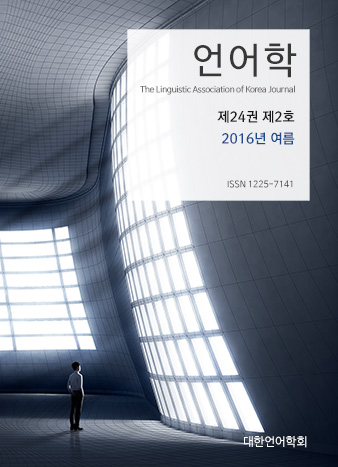대한언어학회 전자저널

-
A Corpus-based Study on the Use of English Present Perfect by Chinese EFL Learners
-
A Study of Curricular Components of English/Korean-Language Textbooks
-
The Effects of Listening Encoding Strategy Use on Korean EFL Learners’ EAP Listening Comprehension
-
A Study on the Correlation between Self-Efficacy Beliefs and Strategies in English Reading
24권 2호 (2016년 6월)
- The Effects of Listening Encoding Strategy Use on Korean EFL Learners’ EAP Listening Comprehension
-
Hyun Ji Cha
Pages : 73-100
Abstract
Keywords
# Listening process # Listening strategy # Academic Listening # Listening texts # Listening tests
References
- Bozorgian, H. & Pillay, H. (2013). Enhancing foreign language through listening strategies delivered in L1: An experimental study. International Journal of Instruction, 6(1), 105-122.
- Chaudron, C. (1995). Academic Listening. In Mendelsohn, D. J. & Rubin, J. (Eds.), A Guide for the teaching of second language listening. (pp.74-96). San Diego: Dominie Press.
- Field, J. (2008). Listening in the Language Classroom. Cambridge: Cambridge University Press.
- Field, J. (2008a). Revising segmentation hypotheses in first and second language listening. System, 36, 35-51.
- Hedge, T. (2000). Teaching and learning in the language classroom. Oxford: Oxford University Press.
- Kiewra, K. (1985). Providing the instructor’s notes: An effective addition to student notetaking. Educational Psychologist, 20(1), 33-39.
- Kim, D. (2008). The effects of note-taking strategies on EFL college students' English listening proficiency. Modern English Education, 9(2), 110-126.
- Kim, J. (2012). Effects of note-taking strategy training on Korean college students perceptions and performance on academic English listening tests. Unpublished doctoral dissertation. Seoul National University, Seoul.
- Lynch, T. (2011). Academic listening in the 21st century: Reviewing a decade of research. Journal of English for Academic Purposes, 10, 79-88.
- Oh, H. (2011). The effects of listening strategies instruction. Modern English Education. 12(3), 283-304.
- O'Malley, J., Chamot, A. & Küpper, L. (1989). Listening comprehension strategies in second language acquisition. Applied Linguistics, 10(4), 418-437.
- Pagoda Language Education Institute. (2013). The iBT TOEFL Beginner Listening. Seoul: Pagoda Books.
- Park, G. (1999). The effect of strategy instruction on listening comprehension. English Teaching, 54(1), 3-16.
- Song, M. (2010).The effect of the note-taking format on L2 learners’ note-taking process and strategy use. Korean Journal of Applied Linguistics, 26(3), 351-380.
- Song, M. (2012). Note-taking quality and performance on an L2 academic listening test. Language Testing, 29(1), 67-89.
- Vandergrift, L. (2003). Orchestrating strategy use: Toward a model of the skilled second language listener. Language Learning, 53(3), 463-496.
- Vandergrift, L. & Tafaghodtari, M. (2010). Teaching L2 learners how to listen does make a difference: An empirical study. Language Learning, 60(2), 470-497.
- Yang, J. S., Kim, H. N. & Cha, K. W. (2010).The Role of Note-taking in L2 Listening Performance. English Language Teaching. 22(3), 99-115.